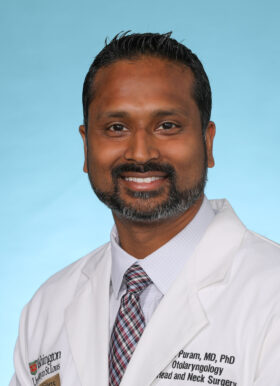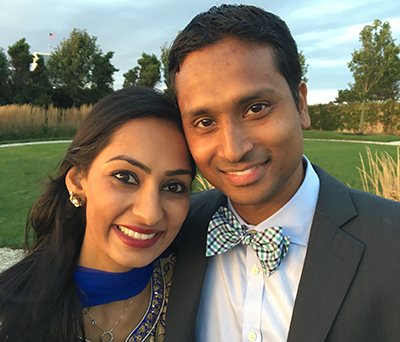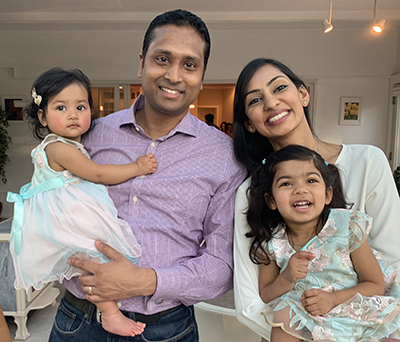Sidharth Puram, MD, PhD

Sidharth Puram, MD, PhD, is an oncologic surgeon who specializes in head and neck cancer and reconstruction. His other areas of specialty include thyroid cancer, salivary gland disease, HPV related tumors, and skin cancers of the head and neck.
Please call 314-362-7509 for an appointment.
What happened in the course of schooling to influence you to choose your specialty?
Interesting question. When I started medical school, I knew I was definitely going to be an oncologist in some capacity. Because of my interest in research I did a combined MD/PhD degree, where my first two years were in medical school (pre-clinical training), followed by research in the lab.
When I entered the lab, I was 100% sure I was going to specialize in medical oncology because I thought that was where I could have the most significant impact on people by developing new therapies and treatments. Through the course of my time in the lab, I realized I really liked working with my hands and enjoyed the gratification (as well as the failures) of an experiment.
During my exposure to surgery, I discovered the technical aspects of surgery and nuances of anatomy better suited my skills and interests than expansive morning rounds. I realized that as a surgeon and an oncologist, I might have a substantial impact on my patients by explaining the treatment, removing the cancer, and hopefully giving the patient good news that the surgery was a success and in some cases, treatment is finished!
Combining the skills needed for research with the skills needed for surgery, in order to help my patients with cancer, has been a perfect fit for me — even though it was a considerable deviation from my original career plan.
How did you zero in on head and neck cancer?
I considered many different fields. At the end of the day, I found a lot of love for the intricate anatomy of the head and neck, and specifically head and neck surgery. I realized there was such diversity within the field otolaryngology (ENT), but that, ultimately I am the type of person who would rather deeply understand and manage a set of conditions rather than maintain a broad expertise across ENT.
Head and neck is one of the few fields where, even if a patient has advanced disease such as stage IV cancer, in the vast majority of cases, it is still treatable and there is a real possibility of curing that patient. To be able to have such a positive and long lasting impact on a patient, is a very unique opportunity. In addition, as the head and neck surgeon, I often serve as the patient’s primary oncologist for the purposes of surveillance and monitoring for recurrence. This role adds a personal element to being a head and neck surgeon that is deeply satisfying as you get close to a patient and their family over time.

What brought you to Washington University?
I can honestly say that coming to Washington University was definitely a welcome surprise and was not something I ever anticipated.
I grew up in Minnesota, but after I graduated from high school, I spent 17 years in school/training in Boston at MIT and Harvard (with one year spent doing a microvascular fellowship in Ohio). I always assumed I would end up on the East Coast because that is where I spent my entire adult life and had such a positive training experience.
However, a brief look at opportunities at Washington University rapidly changed things. I quickly recognized that Washington University is at the forefront of medicine and is top notch in terms of opportunities for research, with an extremely collegial, “Midwest-nice” attitude all within a team-based environment. To have this combination of cooperation and opportunities, along with academic rigor, is something very unique. Washington University has been a perfect fit for me and it was obvious that it was an opportunity I could not possibly pass up.
Which aspect of your practice is most interesting?
It’s a hard question for me because I consider myself somewhat of a chameleon. I’m in the rare breed of surgeons who also have an independent laboratory. That’s not very common among surgeons generally, especially those who are doing head and neck cancer surgery.
I consider treating patients and doing surgery the most exciting aspect of my practice – especially surgeries that involve head and neck reconstruction. Often times, patients who have had head and neck cancers are left with a large facial defect (or hole) because we resect a portion of the jaw, face, and/or neck. Obviously from a cultural and social standpoint, as well as functional (swallowing and speaking) perspective, that is a hard place to leave someone. Thirty years ago, there were few options available for these patients and as a result even though a cancer could be removed, the defect left behind was inadequate with a functional life.
Today, we have taken major strides and dramatically advanced techniques, some of which I learned during my fellowship. Using free tissue flaps, we are able to borrow tissue from other parts of the body – the back, the arm, the leg, the stomach – tissue that acts beautifully to reconstruct the hole that was made from a cancer operation, giving patients a chance to be relatively normal in many cases.
After surgery, when my patients are cancer-free and having a good quality of life – that is something from which I derive a tremendous amount of joy.
I also really enjoy working in the lab and through research trying to identify ways to eliminate the need for surgery or to reduce the impact of surgery on patients through new methods and treatments. I hope someday to look back on my career and see that we have shifted the way we treat head and neck cancer because of some of the contributions I have made, along with others. The possibility of affecting numerous patients in a meaningful way is something that really excites me about our research.
What is the focus of your research?
Very broadly I can describe our research as being focused on tumor heterogeneity. The idea emerging within the cancer field is that tumors are not all the same. Within any given patient’s tumor, it is not just a homogeneous ball of cells, but actually different cells in different states.
There may be one cancer cell that is rapidly growing and may be responsible for the increase in the size of the tumor. There may be one cell that actually invades beyond the outside of the tumor and may be the cell that enables the cancer to spread to the lymph nodes or to the lungs or beyond.
I would compare it to bees in a hive. Within the hive, the queen bee, worker bees and drones all work together to make sure the colony is viable and expanding – but they all have different, yet essential roles.
We are really interested in understanding what role these “bees” or different cells have in the tumor. We can begin to understand which are the cells that cause a tumor to come back, which are the cells that cause a tumor to spread, which are the cells that are hiding out and escaping drug treatment (resulting in the cancer to return a few years later), and which are the cells that are causing the immune system to react or not to react.
So once you define that, you can develop new ways of diagnosing patients, target those cells to develop new treatments, and determine what kind of treatment is best for each patient. That would have tremendous implications for how we manage patients in head and neck cancer or even more broadly across oncology.

Where are you from?
I grew up in Edina, Minnesota, a suburb of the Twin Cities. My parents emigrated from India before I was born. Funny story about how my dad chose to move to Minnesota. He was looking at brochures for various business schools and he saw a brochure for the University of Minnesota – the picture was taken in the middle of summer with flowers everywhere. Minnesota is known for beautiful summers, but also known for brutal winters (which wasn’t pictured). The plane landed in Minnesota, my dad stepped off with one suitcase and wearing a button down shirt in the middle of January when the temperature was 15 degrees! Despite that temperature he remained undeterred and he settled and started our family there.
My parents lived in Minnesota until recently when they moved to St. Louis to be closer to us, after I took this job. Growing up in Minnesota was wonderful. Nature is so accessible. It is known as the land of 10,000 lakes – but it is really more like 13,000 lakes. You can’t really go 500 to 1000 feet without being a stone’s throw from a pond or a lake. It was a great place to grow up with kids playing neighborhood capture the flag on a warm summer night or building a 10 foot snow fort in the deep freeze of winter. People from Minnesota are very similar to people down here – nice, friendly, and welcoming.
Which particular award or achievement is most gratifying?
The award I am most proud of is when I received the Chief Resident Teaching Award. This award is given to a chief resident who is not only a good teacher, but one who serves as a role model and mentor for the residents. It is actually voted on and chosen by the residents, not the faculty. It was at this moment where I realized a commitment to teaching can have a profound impact on others, and it was deeply humbling. It further motivated me and underscored the importance of teaching – to be able to engage the residents, and take the necessary time so that he or she is learning in the best possible way. Because, at the end of the day, my responsibility at a place like Washington University is to educate future leaders. Receiving that award is something I am extremely proud of and something I will always cherish.
What is the best advice you’ve received?
I’ve received a lot of advice through my surgical residency and fellowship. However, I can say that the best advice I’ve received, despite all the medical training, was from my mom. After a diagnosis with breast cancer, she became very spiritual and embarked on a very different career and personal trajectory than she ever anticipated. She used to always say, “Worry about the things that are in your control and try to let go of the things that are out of your control.”
This was excellent advice, especially when I was getting stressed out at times during my residency. As a surgeon, it is even more critical because there are so many things that are out of your control. But if you take a step back and focus on what is under your control, it allows you to be the best version of yourself and take the best care of patients.
If you weren’t a doctor, what would you like to be doing?
There are some days when I wonder what I would be doing if I wasn’t here. In order to help people, I would dedicate myself 100% to research like many PhDs do and focus on head and neck cancer or more broadly, other aspects of cancer.
But if I had to think beyond medicine and science, things seem a little more open. The safe route would have been to be an entrepreneur and started a business. Combining my focus in engineering from MIT with my interest in health care, would have probably led me towards using technologies to improve the way people approach health care. To implement this idea in a commercial setting would be very exciting and it’s something I actually hope to return to someday. But if that was a bust, I probably would be an EDM (electronic dance music) DJ – something about the high energy music just seems to make people happy and bring out the best in a group of random strangers. It would be fun to be that person who influences a crowd so positively.